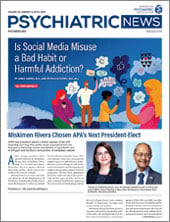Early on in her therapy sessions with Ashley Dandridge, Psy.D., a 14-year-old Black patient told Dandridge: “I didn’t know race or racism was something that we could talk about in therapy.”
Previous outpatient clinicians had never spoken with Sarah (not her real name) about her identity as a Black girl, racism, or racial stressors. Dandridge worked with Sarah to address the racism she encountered in daily life and some of the traumatic experiences she had experienced at home.
Dandbridge is a psychologist at Allegheny General Hospital’s Center for Traumatic Stress in Children & Adolescents. She shared Sarah’s story during a session at the American Academy of Child and Adolescent Psychiatry’s (AACAP) annual meeting in New York. Key to her work with Sarah was trauma-focused cognitive-behavioral therapy (TF-CBT), combined with racial socialization. “I did a lot of psycho-education with Sarah’s mom on the different forms of racial stress and trauma,” Dandridge said.
She also educated Sarah and her mom about racial socialization, using handouts created by Isha Metzger, Ph.D., L.C.P. Metzger is an assistant professor of psychology at Georgia State University and director of the EMPOWER Lab, which aims to increase engagement in mental health treatment within the Black community.
TF-CBT is an evidence-based treatment for children and teens that usually is provided both to the child individually and with the child and caregiver together. It was developed by Judith Cohen, M.D., and colleagues for traumatized children. Cohen is a professor of psychiatry at Allegheny Health Network (AHN) and Drexel College of Medicine in Pittsburgh.
The concept of integrating TF-CBT and racial socialization was Metzger’s vision. Last year, Metzger; Dandridge; Cohen; and Anthony Mannarino, Ph.D., chair of psychiatry at AHN, wrote an
implementation manual on integrating TF-CBT and racial socialization. The manual outlines strategies clinicians can take for incorporating racial socialization into TF-CBT when treating Black youth aged 3 to 17 and their parents.
At the AACAP meeting, Metzger described the well-documented negative outcomes that Black children experience due to various forms of racism, such as interpersonal or systemic racism. Racial socialization refers to the ways in which minoritized caregivers teach their children how to safely navigate a society in which they will likely experience racism in some form.
“It’s the ways in which we talk about our pride and our sense of self-esteem in order to combat those negative messages that we’re … receiving and that can lead to negative outcomes,” Metzger said.
While experiences of racism can lead to outcomes like posttraumatic stress disorder (PTSD), depression, or anxiety, racial socialization can improve a child’s sense of safety, racial identity, and overall psychological resilience, she said. Most Black families are already practicing racial socialization, she added.
“TF-CBT has been used for Black youth, and it has strong evidence, with 25 randomized, controlled trials that document that TF-CBT is efficacious … for improving not only PTSD, but also depression, anxiety, and trauma-related cognition,” Cohen said at the AACAP meeting. It has also been shown to help parents or caregivers with their own mental health issues, she added.
Metzger outlined numerous practice components through which racial socialization can be integrated into TF-CBT. Psychoeducation, for example, is designed to normalize and validate experiences, in this case racial stressors. “We talk to kids about the negative impacts of experiencing abuse, and we also need to normalize experiences related to discrimination, as well as their reactions to those experiences,” she said.
During the joint meetings with youth and their caregivers, clinicians should focus on promoting healthy, positive communication about racial stressors. “You can really utilize these sessions to encourage ongoing communication about racial stress as well as those coping strategies that are really important,” Metzger said. Clinicians can encourage families to incorporate racial socialization strategies into their routines that promote bonding, such as cooking a traditional African meal together or watching a movie or television show focused on Black heritage.
Dandridge said that, by the end of her therapy sessions, Sarah’s score on the Child PTSD Symptom Scale for DSM-5 dropped from 33 (considered moderate PTSD) to 8 (which is in the normal range). Dandridge said she encouraged Sarah and her mom to do activities together. They signed up for a gym membership shortly after Sarah started therapy, as they both enjoyed exercising, and went almost daily together. They also got part-time jobs making hair and skincare products for Black women.
“This really helped boost Sarah’s self-esteem around her hair and skin,” Dandridge said. “It made her feel beautiful.” ■


